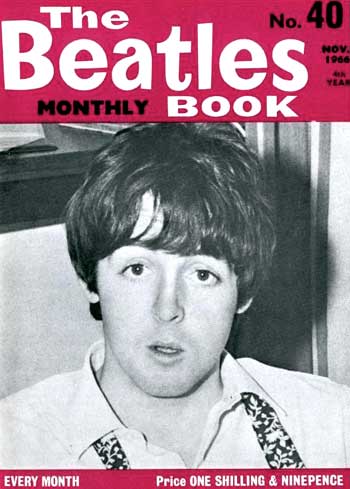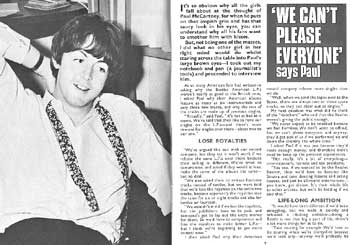|

ABOUT THIS INTERVIEW:
The November 1966 issue of The Beatles Book Monthly featured an exclusive interview with Paul McCartney.
Topics of conversation include the differences between their British and American albums, negotiations with Capitol
Records, touring, songwriting, and the Revolver album.
First published in 1963 and continuing throughout their career and beyond, The Beatles Book Monthly was
the official fanzine of the group. It took full advantage of having access to amazing rare photos, it
featured exclusive articles, and contained insights not found anywhere else. Sometimes also listed as
Beatles Monthly Book, previously-owned copies of these excellent magazines continue to circulate in
collector's circles, including online sites such as Ebay. While this UK-based fanzine had a rebirth in
the late 70's and 80's, the most intriguing issues come from the years when the band was together.
- Jay Spangler, www.beatlesinterviews.org
Article © 1966 Beat Publications LTD.
It's so obvious why all the girls fall about at the thought of Paul McCartney, for when he puts on that impish
grin and has that saucy look in his eyes, you can understand why all his fans want to smother him with kisses. But,
not being one of the masses, I did what no other girl in her right mind would do whilst staring across the table
into Paul's large brown eyes -- I took out my notebook and pen and proceeded to interview him.
 As so many American fans had written-in asking why the Beatles' American LPs weren't nearly as good
as the British ones, I asked Paul why their American albums feature as many as six instrumentals and only
three new tracks, and why the rest of the tracks are made up of previous singles.
As so many American fans had written-in asking why the Beatles' American LPs weren't nearly as good
as the British ones, I asked Paul why their American albums feature as many as six instrumentals and only
three new tracks, and why the rest of the tracks are made up of previous singles.
"Actually," said Paul, "It's not as bad as it seems. We're told that they like to have our singles on the LPs,
and there's more demand for singles over there... about two to our one."
"We've argued this out with our record company, but they say it won't work if we release the same LPs over there because
their selling is different. We've tried to compromise and asked if they would at least make the cover of the albums
the same, but no deal."
"We also asked them to release fourteen tracks instead of twelve, but we were told that we'd lose the royalties on the
extra two tracks, because apparently (in the United States) the royalties stay the same for six or eight tracks and
also for twelve or fourteen."
"We wouldn't mind if we lost the royalties, but the publishers have to be paid, and someone's got to lay out the extra
money for them. So we'd have to compromise and lose the royalties to make better (American) LPs... but I think we're beginning
to get more control now."
I then asked Paul why their American record company releases more single than we do.
"Well, when we send the tapes over to the States, there are always two or three spare tracks, so they put them out as
singles."
What did he think of the knockers who said that the Beatles weren't giving the public enough?
"We never expect to be knocked because we feel harmless. We don't want to offend, but we can't please everyone, and anyway,
they'd get sick of us if we performed up and down the country the whole time."
I asked Paul if it was just because they'd made enough money, and therefore didn't need to keep up the
personal appearances.
"Not really. It's a bit of everything -- over-exposure, laziness, and tax problems. You see, if we wanted to be the Beatles
forever, then we'd have to become like Sinatra and take dancing lessons and acting lessons, and just be all-round entertainers...
you know, get slicker. It's their whole life to other artistes, but we'd be kidding if we said that."
"It would have been different if we'd been struggling, but we made it so quickly and achieved a life-long ambition. Being
a Beatle is not that big a part of life. There's lots more things for us to do. Take touring for example. We'd hate to be
touring when we're thiry-five because we'd look silly. Anyway we'll probably be bald when we're thirty. Can't you see it...
they'll be asking us to shake our hair, and we'd have to say 'We can't because we've got a bald patch.' Everyone has to get
old. It's just that a lot of people don't adapt themselves and do exactly the same as they did at twenty, even though they are about forty."
On the subject of touring, I asked Paul whether or not they'd be doing a British tour. "I don't think we've really thought
about not doing a tour in Britain this year."
"You don't really miss touring. You get to rely a lot on your audience for your act, which means that when you perform
live it's difficult to keep control of what's going on. I still get the same feeling as we had in the beginning. It's not quite as
exciting doing a tour here as when we first started. But in a way it's the same. You still get rough nights with the good ones."
I asked Paul if he ever worried about not being able to come up with new material.
"No. I used to think that, and was frightened that I was going to dry up, but now I realize that it won't happen if you're interested.
Our songs are always changing. But you still get the type of person who sticks to something even if they don't like it... Everyone
can do something else... even a bank clerk or a labourer. I get annoyed with people who are too nervous to change their way of life."
"People say 'Yesterday' was my greatest piece of work, but I hope I will write a better one."
I asked him what had happened to the Beatles' plans to record in the States.
"Well, as I said before, we wanted to record some tracks for 'Revolver' in Memphis, but it all fell through for various
reasons when Brian (Epstein) went over there to check up. We did go into the matter again when we were on our last American
tour, but we found that the idea was going to prove very expensive and, as we didn't like being taken for a ride just
because we're Beatles, we dropped it."
"One of the reasons why we wanted to try doing some recording in the states is that we have heard so much about the different
sound they get. I think that 'Revolver' did produce a new sound anyway. Perhaps by accident, perhaps not. We have been
looking for it a long time, and something was definitely there. We'd still like to record in the states, but I can't see
it happening in the near future."
I finally asked Paul what he thought of their old hits -- do they sound old fashioned?
"Yes. They're a step back in time, and as for performing them on stage I don't think our audience would like it... but that of
course depends on where we're playing. Germany, for example, cried out for the old hits because that is what they remembered
us for."
Source: Transcribed by www.beatlesinterviews.org from original magazine issue
|

